Saving the planet doesn’t require flawless habits—just manageable ones that stick.

Scrolling through zero-waste influencers proudly displaying a year’s worth of trash in a single mason jar can feel inspiring at first—but quickly turns daunting. Most of us don’t have the time, resources, or patience to perfectly curate sustainable lifestyles, and chasing that unattainable ideal often leads straight to burnout. Truth is, obsessing over perfection isn’t helping the environment—it’s just making sustainability feel exhausting. Thankfully, reducing waste doesn’t have to be an all-or-nothing game, and small actions matter far more than perfectly executed ideals.
Embracing a “good enough” approach takes the pressure off, allowing manageable, imperfect habits to fit naturally into your daily routine. These tiny shifts are often the ones you’ll actually stick with, making them more impactful in the long run. So forget Instagram-worthy pantries and meticulous compost setups—here are 12 genuinely realistic low-waste hacks that’ll shrink your footprint without ever demanding perfection.
1. Forget bulk bins—just buy the largest package you can handle.

Bulk bins are the poster child for zero-waste shopping, but they’re not always practical. Filling reusable jars sounds great until you’re lugging heavy containers home or spilling quinoa all over the store floor. Instead, just buy the largest package of your frequently used items that’s still manageable.
According to Zoë Morrison at Eco Thrifty Living, buying in bulk can reduce packaging waste and save money, as larger packages often result in less overall packaging compared to multiple smaller ones. This approach allows you to make a meaningful difference without sacrificing convenience.
Plus, larger quantities often save money in the long run, and you’ll shop less often, freeing up precious time. It’s not about having a pantry straight out of Pinterest, it’s about realistically cutting back on waste in a way you can actually sustain. Your kitchen might not look perfectly curated, but your trash bin will noticeably shrink—and that’s good enough.
2. Skip homemade cleaners if vinegar does the trick.
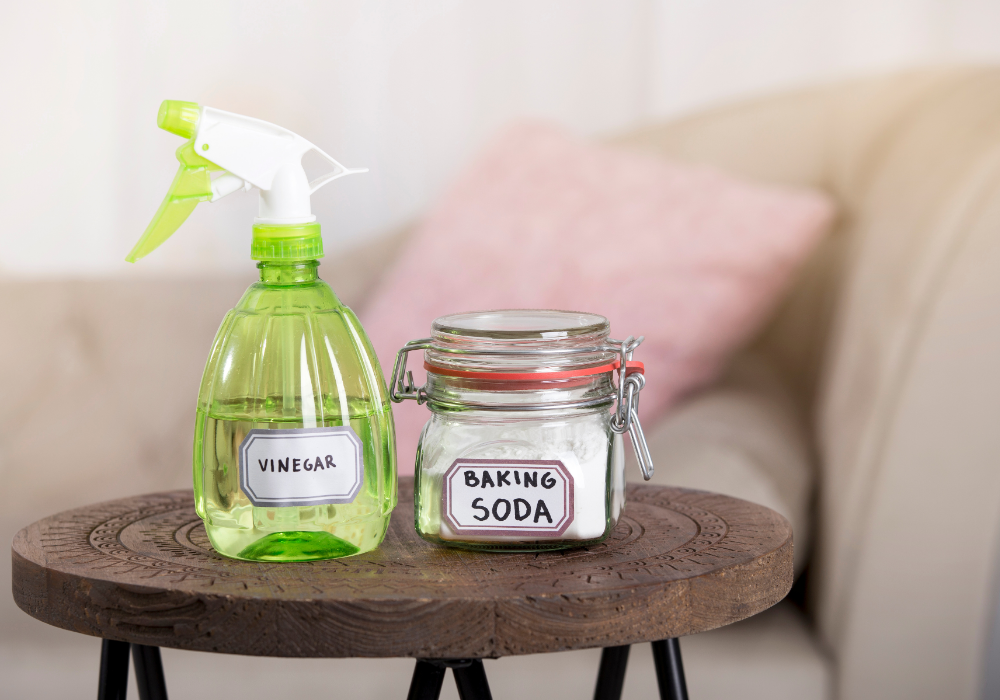
Sure, those beautiful glass spray bottles of homemade cleaners with essential oils look appealing on social media—but who has the time? Vinegar is already a powerful cleaner, tackling grime, mold, and stains effectively without complicated recipes or a lengthy list of ingredients. Kirsten Nunez of Healthline explains that vinegar’s high acidity helps break down stubborn soap scum, dirt, and mineral deposits, making it an excellent natural cleaner when diluted with water.
This minimal swap cuts down on plastic spray bottles, harsh chemicals, and unnecessary packaging. You’ll also spend less money, freeing you from overpriced eco-friendly brands. Your home might occasionally smell a bit like pickles, but you’ll quickly learn to appreciate vinegar’s simplicity and effectiveness. A spotless home without the fuss? That’s sustainable cleaning done right, even if it’s not exactly Instagram-worthy.
3. Toss the produce bags—your veggies won’t care.

Neatly packing every carrot and zucchini into separate produce bags at the grocery store is a habit that feels automatic—but it’s entirely unnecessary. Courtney Lindwall of The Natural Resources Defense Council states that eliminating single-use plastic produce bags reduces plastic waste and minimizes environmental impact. Veggies and fruit can comfortably ride loose in your cart, basket, or reusable shopping bag without complaint.
Yes, your produce might roll around freely, but it won’t impact freshness or cleanliness. If you’re still worried about keeping things separate, reusable cloth bags work fine, but don’t feel obligated. The truth is, your produce doesn’t care about perfection, and neither should you. Letting go of this minor convenience adds up significantly over time, simplifying your shopping routine while significantly reducing plastic waste. Imperfect produce habits are absolutely good enough here.
4. You don’t need bamboo utensils—just grab a fork from home.
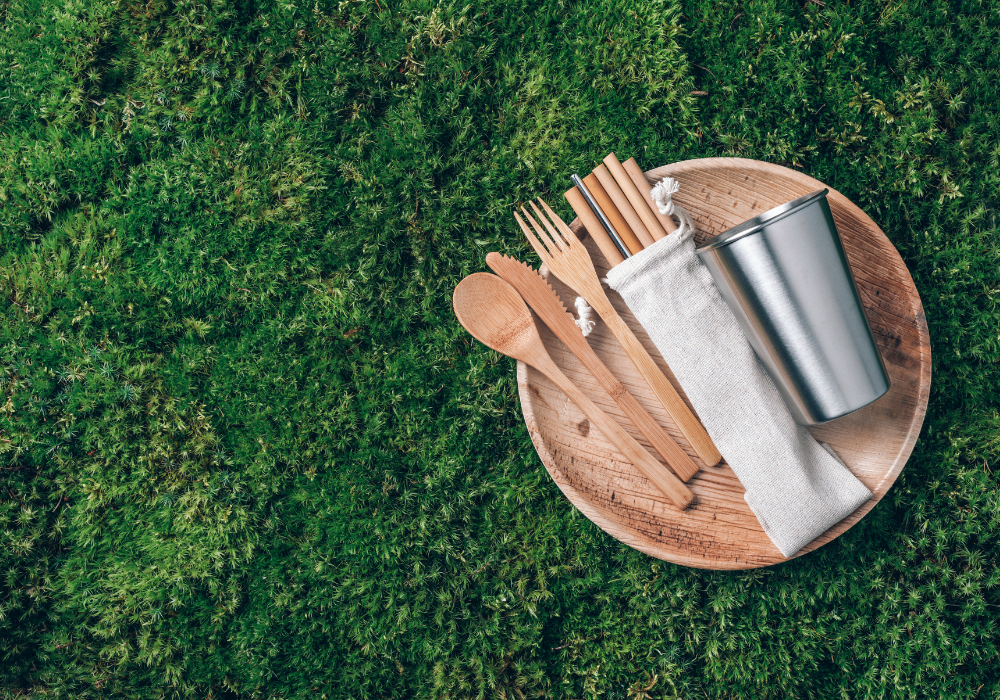
Sustainable influencers make carrying bamboo utensils look effortless, but remembering another item to pack each day is easier said than done. Save yourself the hassle and simply stash some old silverware from your kitchen drawer into your bag. It’s cheaper, simpler, and just as eco-friendly. After all, the most sustainable option is using what you already own.
It’s easy to rinse your utensils after meals and put them back in your bag. They’ll last longer than trendy bamboo versions, and you won’t stress if one gets misplaced or damaged. Sure, your silverware won’t earn aesthetic points, but your reduced reliance on disposable plastics will speak volumes. Sustainability isn’t about new purchases—it’s about smartly using what you already have.
5. Who needs fancy mason jars? Any old container will do.

Sleek matching mason jars filled with bulk goods and leftovers might be trendy, but let’s be honest—they’re often pricey and impractical. Instead, repurpose the jars, containers, and tubs you already have from past purchases. An old pickle jar works just as well as a branded container for storing leftovers, soups, or even dry goods.
The mismatched assortment in your fridge and pantry might not be aesthetically pleasing, but it’s effective and waste-free. Plus, repurposing what you already own is genuinely sustainable, reducing the demand for new products and packaging. It saves money and eliminates waste, and there’s no pressure to achieve aesthetic perfection. Your kitchen might look slightly chaotic, but you’ll feel quietly proud of how resourceful you’ve become.
6. Forget reusable straws—sip like an adult instead.

Reusable straws are everywhere, often marketed as an essential first step toward sustainability. But do you really need a straw at all? For most people, straws are entirely unnecessary. Skipping them completely—whether plastic, metal, or bamboo—is the simplest, cheapest, and most effortless low-waste choice of all.
If you really enjoy using a straw, of course, go for it. But choosing to drink straight from your cup or glass instantly cuts down your daily waste without forcing you to carry and clean an extra item. The best sustainability hacks are usually the simplest ones. Skipping the straw entirely removes clutter from your routine and gives you one less thing to worry about. Your drinks taste exactly the same, but your waste—and the planet—noticeably benefits.
7. Save ugly produce—they deserve love too.
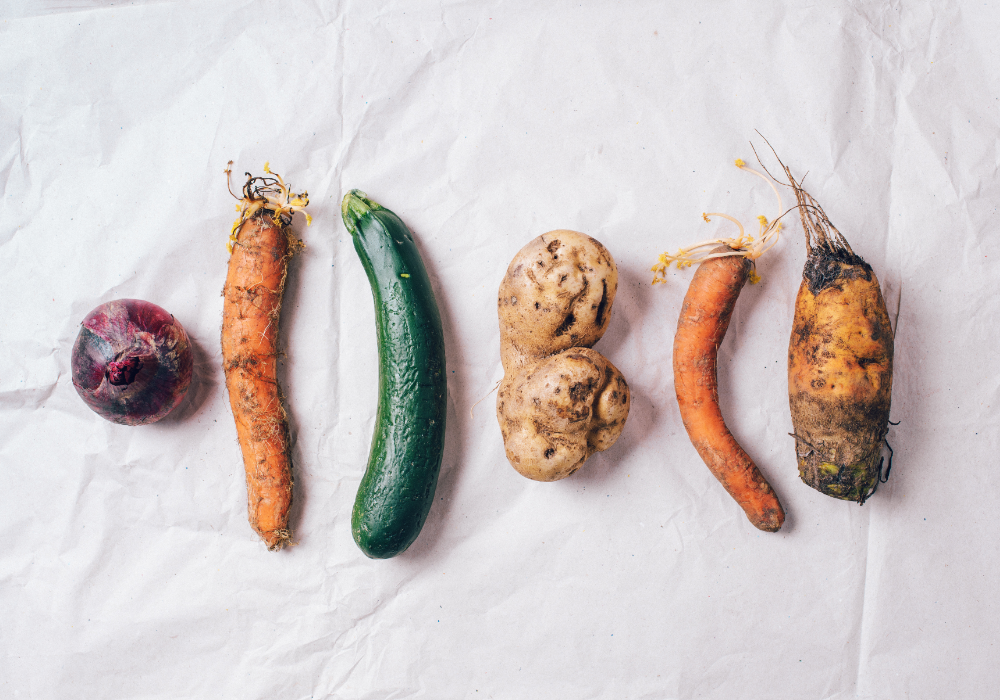
Grocery aisles may push picture-perfect produce, but embracing those oddly-shaped carrots or bruised apples can dramatically reduce food waste—and your grocery bill. Imperfect fruits and veggies usually end up in landfills simply because they don’t meet cosmetic standards. Buying them instead costs less and tastes just as good.
You don’t need special apps or stores; simply pick the produce others overlook. When chopped or cooked, appearance doesn’t matter anyway. It’s satisfying knowing you’ve rescued something nutritious from the trash while effortlessly shrinking your environmental footprint. Plus, ugly produce tends to be discounted, giving your wallet a break. Imperfect produce is the easiest shortcut to sustainable eating, proving you don’t have to chase perfection to make an impact.
8. Cardboard boxes are secretly amazing organizers.

Those cardboard delivery boxes you’ve been tossing out could be the answer to clutter chaos. Instead of buying yet another plastic organizer, repurpose sturdy boxes to neatly arrange drawers, shelves, or closets—no cost, no waste, no hassle. Trim them to fit perfectly, creating custom storage solutions in minutes.
Sure, cardboard boxes won’t make your space look like an influencer’s dream pantry, but they’re sturdy, recyclable, and easy to replace. Repurposing what you already have reduces unnecessary consumption, saves money, and eliminates plastic waste. It’s proof that sustainable habits can be simple, free, and surprisingly satisfying. Ditch the plastic bins; embrace cardboard—and a tidier life that’s realistically eco-friendly.
9. Your freezer loves random containers.

You don’t need matching freezer storage or special silicone molds—whatever container you have handy is good enough. Old yogurt cups, margarine tubs, and leftover pasta sauce jars freeze leftovers just as effectively, dramatically cutting down single-use plastic bags and cling wrap.
Freezing leftovers in existing containers is zero-cost, waste-free, and surprisingly practical. You might lose uniformity, but you’ll quickly realize it doesn’t matter when reheating meals. This hack effortlessly reduces food waste, helps you avoid unnecessary new purchases, and makes your freezer feel like an organized chaos you can actually embrace. Sustainability isn’t about perfect aesthetics—it’s about using what’s available, even if it’s a mismatched collection of random containers.
10. Why hoard tote bags when you can use what you’ve got?

Sustainable shopping doesn’t mean having an endless collection of reusable bags—just a few reliable ones. Resist accumulating trendy totes every time you’re tempted, and start consistently reusing those you already own. Realistically, you only need a handful to cover your weekly errands.
Making a habit of grabbing existing bags each time you shop dramatically cuts plastic waste without extra effort or expense. You won’t win any style points with your slightly worn-out totes, but you’ll cut clutter and significantly reduce waste. Embracing this simple switch proves sustainability doesn’t require accumulating eco-friendly items—it’s about actually reusing them. Less clutter, less plastic, and zero guilt about perfection.
11. Tea towels are your paper towels’ cooler cousin.
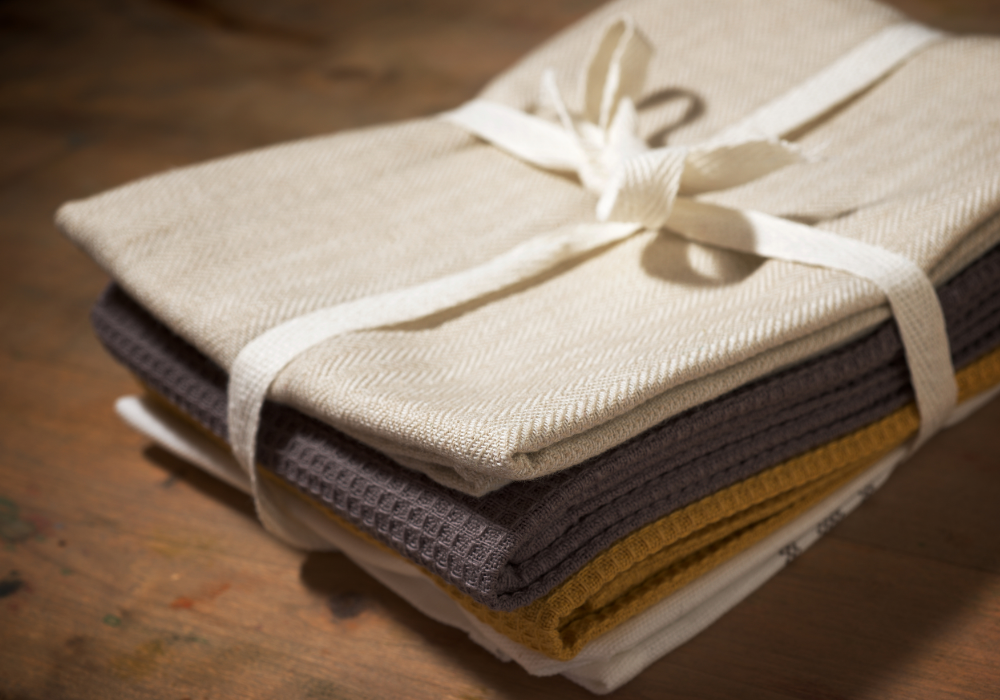
Ditching paper towels completely feels intimidating, but supplementing with reusable tea towels is an easy compromise. Tea towels effortlessly handle spills, dry dishes, and clean countertops, and they get softer with every wash. Stocking your kitchen with a small rotation drastically reduces disposable paper waste without inconvenience.
They’re cheap, versatile, and available practically everywhere—or just repurpose old kitchen linens you already own. No need for trendy designs; function matters more than style. Over time, you’ll notice less trash, lower grocery bills, and less guilt about tossing paper away. It’s the kind of practical switch you’ll stick with—not perfect, but definitely good enough for real life.
12. Stop peeling veggies—they taste fine, promise.
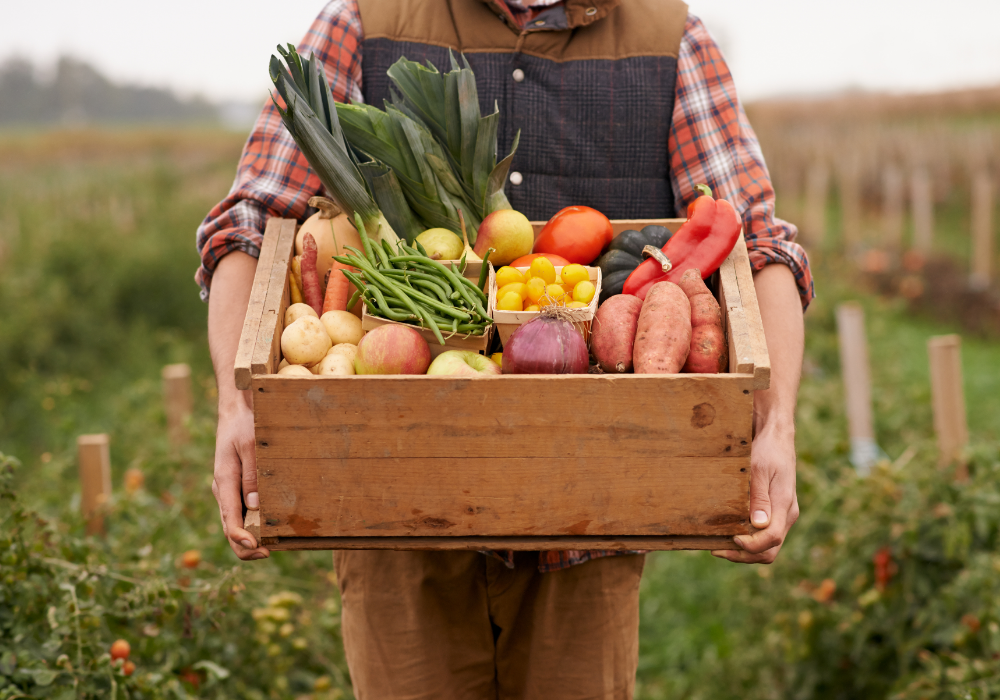
Peeling carrots, potatoes, or cucumbers is ingrained habit—but skipping that step is actually beneficial. Veggie skins are nutrient-rich, tasty, and perfectly edible, so leave them on to save prep time and reduce kitchen waste. Your dishes taste just as delicious, and you’ll instantly cut down on unnecessary food scraps.
Embracing unpeeled veggies saves effort, prevents food waste, and might even make cooking feel less tedious. No special tools or tricks required, just a simple change of habit. Your compost bin fills up slower, your cooking speeds up, and your sustainability habits become simpler. Imperfect prep suddenly becomes the ideal shortcut to effortless low-waste living.